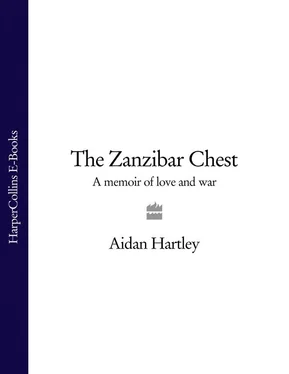1 ...8 9 10 12 13 14 ...26 Soon after my parents settled on En’nekeraka, the Mau Mau emergency broke out. First my father’s cattle were hamstrung by the guerrillas. Then a gang chopped their neighbour into little pieces while he was taking his bath. My parents saw the way things were going and so decided to up sticks and move to Tanganyika. Soon after they left, police burned down the house on En’nekeraka, claiming that it was a late-night meeting house for terrorists.
I clearly remember, at about the age of three, trying to recollect what had happened up to that moment in my life. I looked back to oblivion, all apart from a single conscious moment. In this tiny phrase of time that is with me still, I am sitting up in my cot, crying, in a cool, bluish white room with windows opening out onto a vast, dry landscape. A sublime figure enters the room and, speaking softly, soothes me back to sleep, I suppose, because my memory stops there. My recollection is from my parents’ new Tanganyika farm, which they called Langaseni. My mother saved a handful of photographs and scratchy, heat-damaged film from the years at the farm. Otherwise, I have no sense of what Langaseni was like in those days, though I have heard about it all my life from everybody else in the family. From the stories, and they were almost lectures, I formed such a strong mental picture of this African paradise that I feel I could find my way around every single hill and tree of the place. I’d know the horses in the stable, the dogs sunning themselves on the veranda, my elder siblings with their hair flaxen blond, and my father on his horse, riding down the dusty track under thorn trees. As a man I’ve visited the farm and nothing of my idyll survives.
The ranch was in the dry, rocky plains, between the snowy sugarloaf of Kilimanjaro and the sharp, black mass of Meru. The farm’s western boundary was the Red River, coloured by fluorine that blackened teeth and bones. Along the east was the Cold River, glacial and blue, flowing among glades of fever trees. To the south was a moonscape of volcanic hillocks like bubbles, covered with sparse, wiry grass, or sands and stunted thorn. On hard red soils to the northwest grew thickets of wait-a-bit thorn and aloes. In the north, on the edge of a plain teeming with game, was Firesticks Hill, Ol Lekema Jipiparuk. My parents built their first huts here with horse stables made of split euphorbia trees. Later, they built a house with a flat roof like an Arab fort. The walls were of volcanic stone. The roof beams were giant cedar trees Dad had dragged down from Kilimanjaro’s forest by ox wagon. The doors and windows were made of camphor and they looked up at the mountains on either side.
At night, lions grunted and roared and the hollow volcanic hill rumbled as rhino cantered by. Coral-coloured snakes migrated across the plains en masse in season and in the glade below the home were dark-spotted giraffe, zebra and impala. In the dry open country were Grant’s and Thomson’s gazelles, oryx, wildebeest, cheetah, hunting dog, hyena and jackals. In the wait-a-bit thorn were long-necked gerenuk and lesser kudu. Flocks of sandgrouse drank at the salty rainwater pans at dawn and at dusk you could hear the rasping chatter of guinea fowl and partridges preparing to roost.
‘We were in a paradise,’ said my father, ‘that we can never forget, nor equal.’
By the time they arrived, my brother Richard was a baby and my sister Bryony was on the way. ‘It was good to start a new life on the ranch, with the thought of more children to come, and the great open air,’ my mother recalled. ‘I said we were going to be there a hundred years.’
They poured what little money they had saved into the farm and borrowed the rest. They started with a small herd of Boran cattle, including a cow that had been slashed on the face by Mau Mau, a truculent heifer that took exception to anybody wearing a hat, four hundred goats, two dogs, Silver the pony and Jamila, an Arab filly (my mother’s wedding present) with three centuries of pedigree, plus a Dodge nicknamed the Red, Red Car. Dad set about building up his herds and bought his stock from the Maasai and European farms in Kenya.
In the bone-dry country, the key to the farm’s survival was water. The fluorine in the Red River was slow poison, the Cold River was seasonal according to the rains and the drums of water they trucked down from pools at Ol Tulali on Mount Meru were thick with baboon shit. When Dad looked across the plains he reasoned there could be water in the ground at the foot of Firesticks Hill, which stood in the way of the line of the Cold River. Flor Visser, an old Boer who had arrived on the banks of Red River in 1904, said: ‘I tell you, Mr Hartley. You will never find water here.’
A plump Swede came to drill at thirty shillings a foot. At first the bit went down through red soil, then clay, then decomposed rock, then volcanic lava to 130 feet. No water. The Swede brought his wife and son down to move in with him in his caravan. The lava got harder and harder. Some days the drilling slowed to as little as eight feet a day. The bit reached 260 feet. No water. The Swede said he was surprised because he had never known a hole that was so completely dry. At 320 feet, no water. The bit went through layer after layer of the glacial mountain Kilimanjaro’s roots, the strata of millions of years. At one point, the drill brought up a chunk of timber from a prehistoric forest. Christmas came and went. At 400 feet, Dad announced that the hole was dry. They had failed. ‘Just one more week,’ Mum urged. ‘Please go to 500 feet.’
‘I told you, British,’ said Visser. ‘No water here.’ There were no wells for miles due to the porous volcanic rock. Everybody knew. And in the remote event of the drill striking water – what then? It would be salty or full of fluorine, you could be sure of that. At 460 feet, no water, and Dad said they were broke. What they would do with no money and no water, they didn’t know. It might have come to an end, but that day a car drove up and out got a man my father had known from Arabia. The visitor announced that the Arab farmers my father had worked with had raised the sum of two thousand pounds for him as a present after he had retired. To my mother’s horror, Dad said he could not accept the gift, saying the farmers should use it for their own irrigation works back in Arabia. The man said, ‘That is what they want you to do with it. They say that wherever you have gone, water has followed. And it’s time for you to find water with this money yourself.’
The next day drilling resumed. The work went on, day after day, until one morning there was an enormous spurt of water. A geyser exploded from the well hole. Clear water spouted in a fountain 160 feet into the air. The water spilled down onto the dry land. It flooded the plain in front of the hill like a flash flood. It gushed at fifteen hundred gallons an hour. There was neither telephone nor radio for miles, but that afternoon Flor Visser drove up in his old Ford truck and parked in front of the fountain of water. He switched off the engine and sat there for hours, staring at the water flooding down and no doubt thinking about the fifty years he had stayed on the arid plains where it had been so hard to make a life. Dad installed a wellhead that nodded like a huge bird. When the borehole was not pumping, strange humming noises came from the subterranean pipe. It was the thrumming of great Kilimanjaro’s volcanic innards. The geyser settled down to a flow of eleven hundred gallons an hour. The water was both fresh and pure.
Our neighbours were the Maasai tribal people and their beloved herds of cattle. Dad knew them well, traded stock at their bomas, but also played a cat and mouse game with them when they raided his cattle or poached his scarce grazing. From the top of the hill behind the house, he could see where the Maasai were on the plain, since plumes of dust followed their herds. He would then saddle up his horse and gallop after them like John Wayne with loud ‘Yehahs!’ The Maasai scattered in all directions, their red shuka togas flapping. If it was after dusk, Dad stalked them by moonlight and fired his rifle in the air to stampede the cattle off the property. Once a lion killed forty Maasai cattle. It also took Dad’s best big grey bull, so he hunted it down, shot it dead and kept the skin for evermore. A crowd of warriors appeared at the house and danced in front of the skin as it hung stretched out and caked with salt. They were in their full regalia of shields, assegai spears and ochre body paint. In a straight line they danced, stamping their feet, kicking up the dust, toasting ‘Bwana Harti’ and his deed.
Читать дальше












